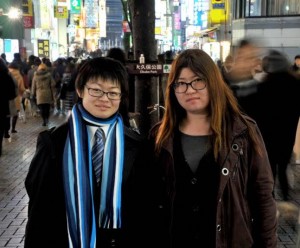
Step by seemingly immeasurable step, Japan is beginning to acknowledge its country’s sexual minorities, an act at once both radical and surprisingly belated. And no one seems to represent those conflicted cultural strains more emblematically than 26-year-old Kazuki Osawa and his partner Shoi Osawa, a childhood friend. What makes this relationship so different is that Kazuki was born a girl and given the birth name Yumiko Higuchi.
“As a teenager, it gradually dawned on me that I was not normal. And the idea that I would have to live the rest of my life pretending to be the person I’m not, in conformity with others, tore me apart,” said Osawa.
But in a country known for its relative stability, any act of non-conformity is considered subversive. And nothing appears quite as subversive as declaring oneself a member of the LGBT community. So much so that TV shows routinely humiliate the LGBT community by depicting men as swishy eccentrics and lesbians and tool-toting, hyper-aggressive women. It’s a message that goes unchallenged in a nation unaccustomed to challenging well-established societal boundaries. And to drive that point home, the message is pervasive, not only in the lack of any meaningful civil protections for the LGBT community but that fact that bullying and intimidation are understood to be a consequence for going against the grain.
“In Japan, once you’re branded abnormal, it’s almost impossible to start over again,” he said, noting the nation’s conformist culture often makes sexual minorities balk at coming out for fear of discrimination.
But things are changing. According to JapanTimes.co.jp, an increasing number of companies and municipalities are open to greater diversity and [becoming] more tolerant toward members of the lesbian, gay, bisexual and transgender population. Thursday, Shibuya Ward, Tokyo (which has one of the highest concentrations of Japanese LGBT members), unveiled its as yet unapproved proposal to issue certificates declaring relationships of its same-sex couples being “equivalent to marriage,” an unprecedented move that, if realized, is expected to make life significantly easier for LGBT ward residents. (Many believe it will be approved. No vocal opposition has been mounted or is expected.)
But while this may seem like a historic first step, the realities are far less encouraging, the paper notes: “Equality Forum, a Philadelphia-based nongovernmental organization seeking to enhance the civil rights of LGBT ranks, reported in 2012 that a record 484, or 96.8 percent, of the top 500 companies ranked by Fortune magazine included sexual orientation in their employment nondiscrimination policies. In contrast, a 2014 survey on corporate social responsibility conducted by Japanese business magazine Toyo Keizai showed that 114, or just 18.7 out of 607 major listed companies in Japan, make efforts to protect their LGBT employees.”
Meanwhile, Kazuki and Shoi are taking the route many same-sex couples take who cannot have their relationships recognized by the state. They are adopting a child. As a result, they can register with the koseki family registry unit. This allows them to be treated as immediate family if one of them should be hospitalized. (The koseki family registry is required by Japanese law. All households are legally bound to report births, acknowledgements of paternity, adoptions, disruptions of adoptions, deaths, marriages and divorces of Japanese citizens to their local authority.)
“Some people dismiss same-sex marriage as meaningless because we wouldn’t be able to make babies,” Shoi said. “But a lot of opposite-sex couples in Japan opt not to have kids and are still allowed to marry. It’s unfair that we’re not.”











